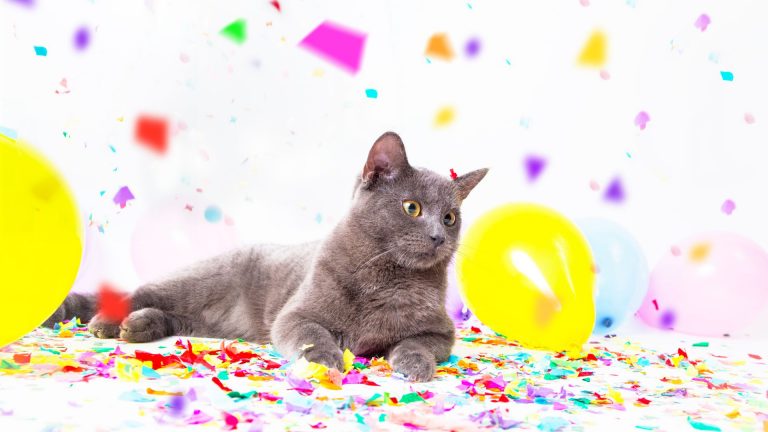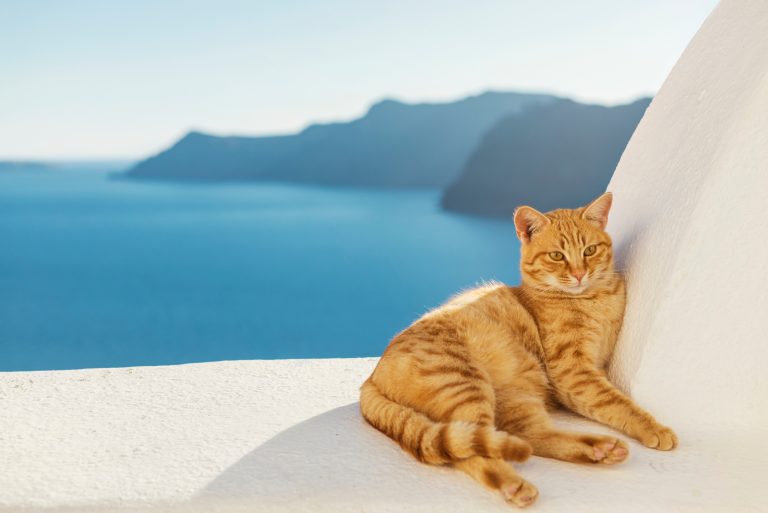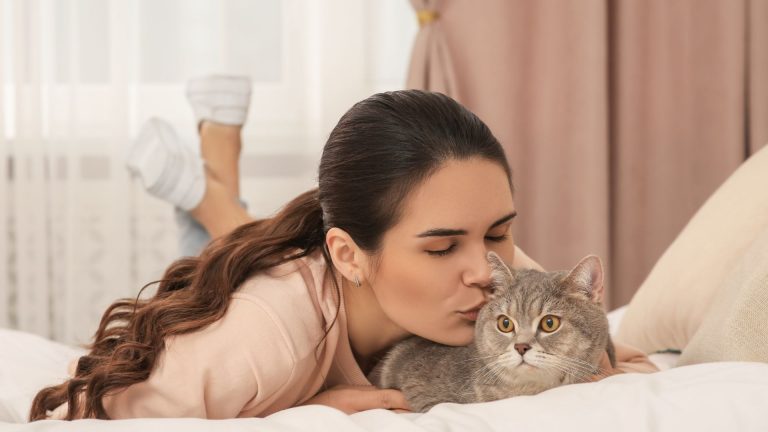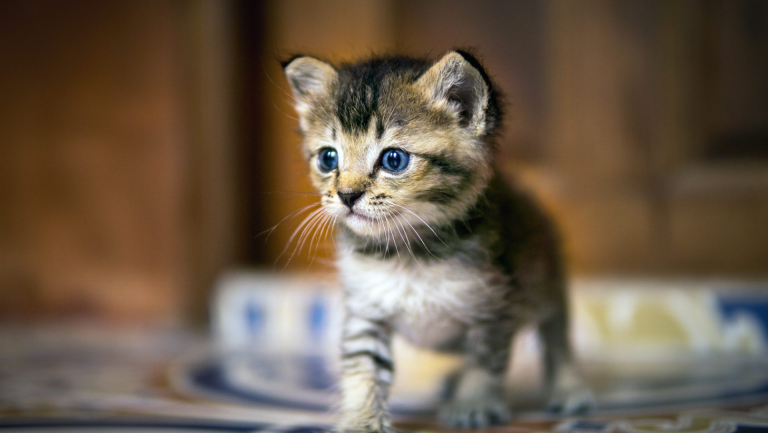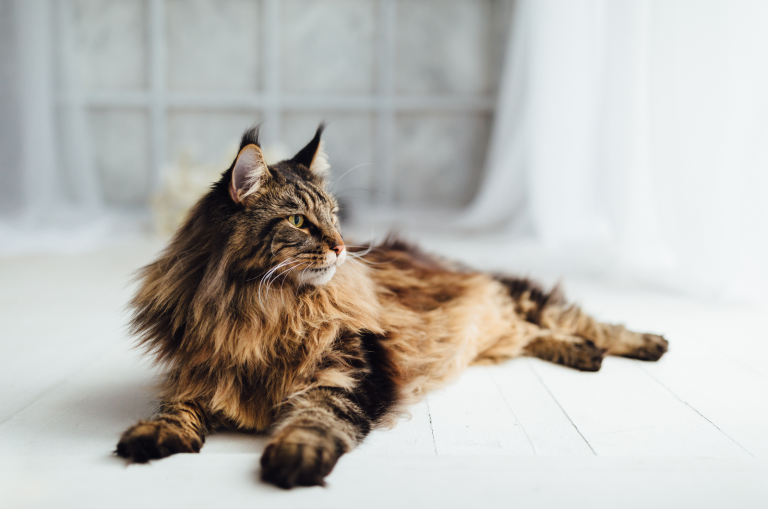My Cat Peed On My Clothes Right In Front Of Me: 9 Possible Reasons
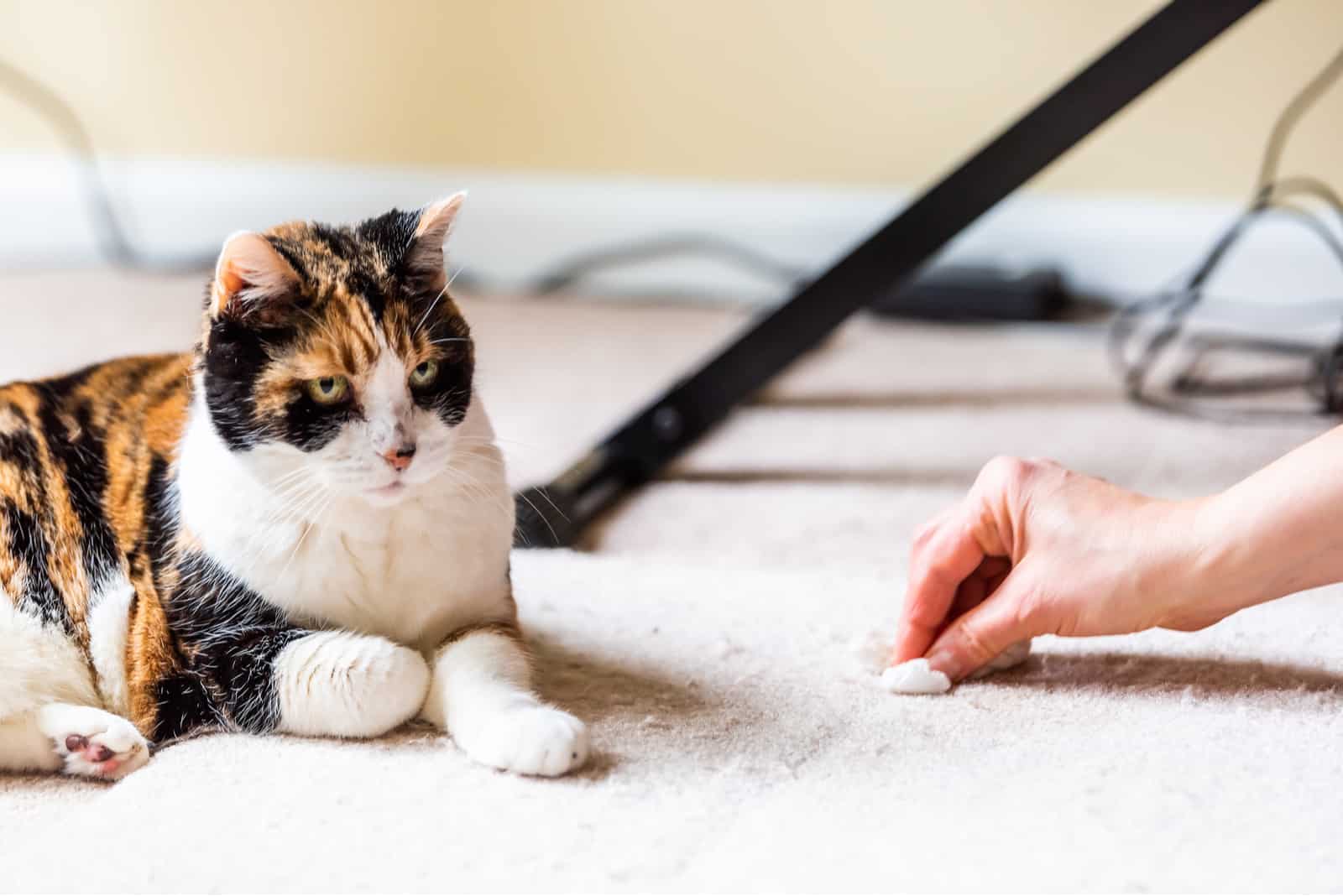
Ah, cats! We all love our furry friends, even though they can sometimes be jerks. However, when it comes to inappropriate urination, they can drive even the most patient cat owner crazy.
It can be even more infuriating if their preferred potty-place is a laundry basket or a pile of clothes in front of a washing machine. Especially because the ammonia-heavy scent of cat urine can turn even the strongest of stomachs!
There are many different reasons why your cat pees on your clothes, including medical problems, behavior issues, and more often than not, a dirty litter tray.
It is important to understand that your cat probably doesn’t understand that it’s doing something wrong when peeing on your clothes, so an aggressive punishment will only confuse and enrage it. You will have to understand the problem before you try to solve it.
So, if you’ve recently had a “my cat peed on my clothes right in front of me” situation, keep reading because this article will go over the most common reasons for such a brazen act!
My Cat Peed On My Clothes Right In Front Of Me – Most Likely Causes
Medical Issues/ Physical Problems
A very common reason you have to consider is that your cat may have health issues. Your cat may be injured, or suffering from some disease which makes urination uncomfortable.
So, if you find yourself wondering “why is my cat peeing on my bed”, you may want to take a look at the following medical conditions.
1. Urinary Tract Disorder
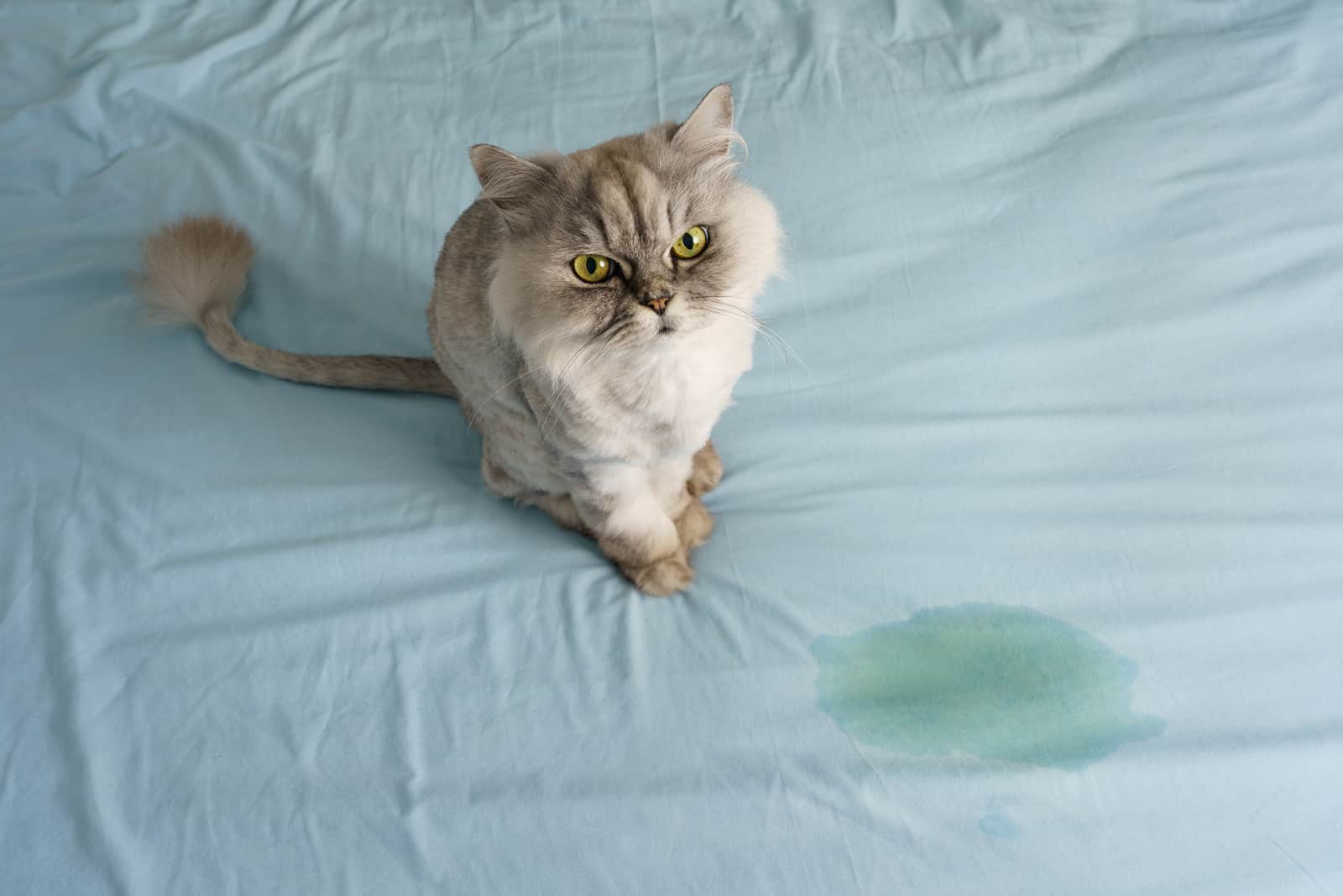
TIt is quite common for cats to suffer from urinary tract diseases. Feline Lower Urinary Tract Disease (FLUTD) is the medical name for a disorder that encompasses many cat urinary issues.
Doctors claim that the main cause of FLUTD is Feline Idiopathic Cystitis (FIC). The problem with FIC is that, despite how common it is, scientists still don’t have conclusive evidence on what causes it. Note: FIC is a Urinary Tract Infection (UTI), so don’t be confused if you see these two used interchangeably.
However, scientists have linked FLUTD to overweight, indoor cats. It is also more common in cats that are on a dry food diet and live in a multi-cat household.
So, if your young cat pees routinely outside the litter box, it may be suffering from FLUTD and it would be best if it got proper medical attention.
2. Kidney Disease
Another health issue which may be bothering your cat is kidney failure.
In this case, your cat will consume more water in order to compensate for the kidneys not recouping water from the urine.
Drinking more, of course, won’t solve the problem, since the kidneys are still not working. On the contrary, your cat will only pee more often, which means that the litterbox may be full more quickly. In this case, your cat will avoid it and find somewhere else to pee, and your pile of clothes may be the most comfortable location.
Again, we recommend medical attention for your cat if you see any signs of kidney disease. Chronic Kidney Disease is a health problem that 1 in 3 cats suffer from, and a visit to the vet is never a bad idea.
3. Arthritis
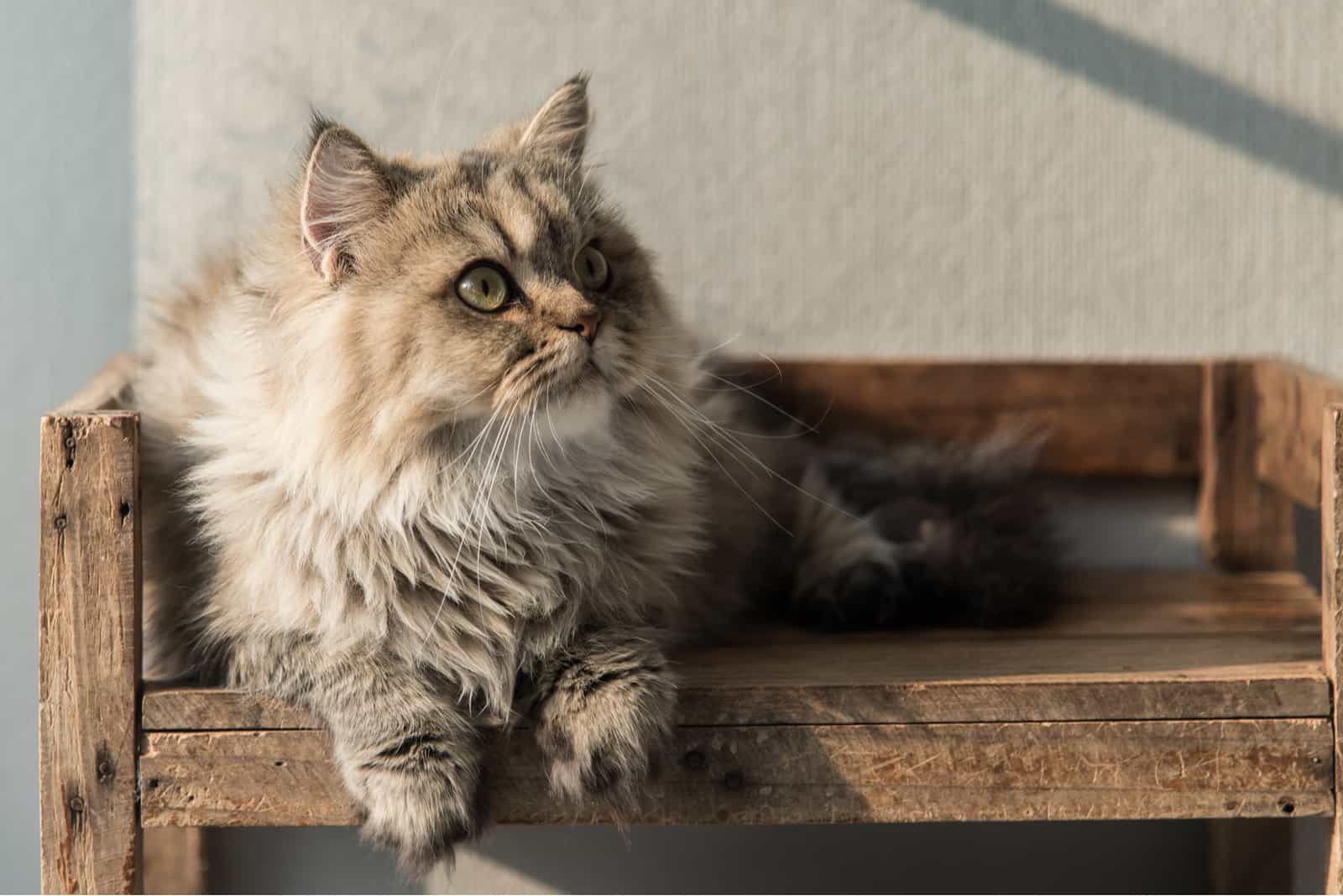
Just like humans, cats often suffer from arthritis in their old age. Studies show that the majority of old cats suffer from arthritis to some degree.
However, even if it is a common issue, it is not easily detected, especially if you have an indoor, older cat that isn’t spending a lot of time outside or being active.
With their regal bearing, it is not easy to spot when a cat has physical issues. However, if you notice your cat having a problem climbing into the litter box, it is safe to assume that it may have arthritis.
Your cat may also be experiencing arthritic pain while urinating. If this is true, then your cat is probably associating the litter box with the pain, which motivates it to find a different location for littering.
Try changing the litter box, or moving it to a more accessible position. Also, visit the vet, because they may provide you with medication to help your cat with pain or inflammation.
Related: 7 Reasons Why Is My Cat Peeing On Furniture + Prevention Tips!
4. Injury
Another physical issue your cat may be experiencing is injury. Injury can cause your cat to feel pain while urinating, which leads to the same result as with the arthritis- the litterbox gets blamed for it!
They may also be fighting with a neighboring cat and drawing the short end of the straw. Cats that get beaten in a fight will often be bitten in the hind parts of their body – lower back or tail. Pain in these parts will cause them discomfort while urinating.
If your cat pees outside the designated litterbox and you notice any sign of injury or pain then you should, once again, take your pet to the vet. It is best if the injuries are treated professionally.
There are many other health problems that may result in inappropriate urination(like bladder stones, diabetes, etc.) but the above listed are the most common, and all require medical attention!
Behavioral Causes For Irregular Urination
Even though they can sometimes seem as heartless little monsters, cats are often prisoners of their nature. For someone who is not familiar with how the cat mind operates, their behavior can seem crazy and sometimes even vindictive!
The truth is, cats rarely do something that cannot be explained, and this is also true when it comes to inappropriate urination.
The following segment will note the most common situations which may result in your cat peeing outside the litter tray.
5. Marking Territory
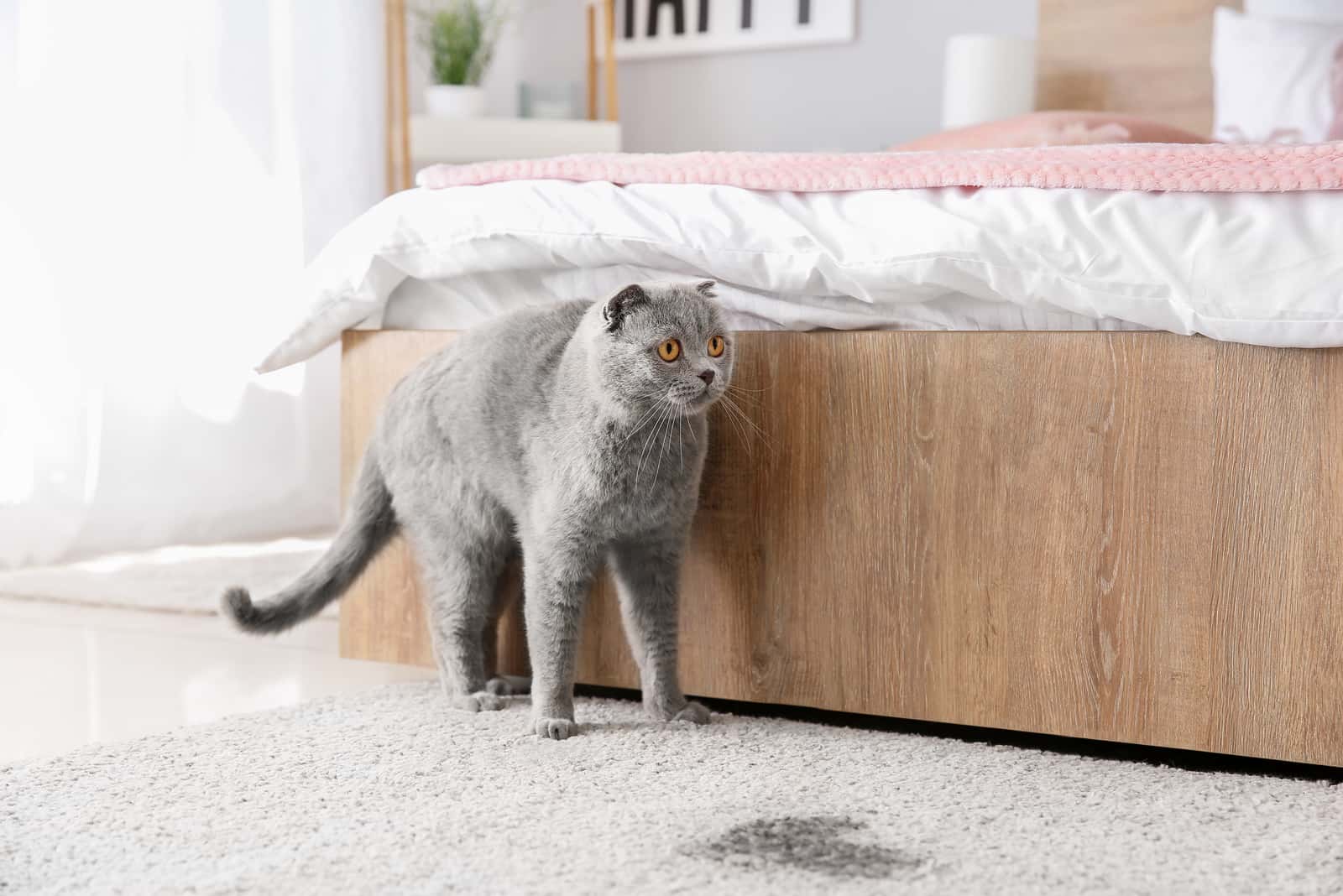
Cats are very territorial, and, like dogs, they use urination to mark their territory. This is called spraying, and it is common for both male and female cats to do it.
Male cats usually do it to assert dominance over other males. Female cats do it to spread their pheromones and attract males. So if you have a female cat peeing on a vertical surface, and especially if she recently spends time meowing at the door, you have a cat in heat, and this is perfectly normal.
People who live in a multi-cat household will often encounter this problem with their cats.
The best solution for this problem is to neuter and spay your cats, which will reduce their urges to mark their territory.
Your cat may also be spraying when it’s the only cat in the household. If this is happening near a window, your cat may be noticing some outdoor cat in the yard, which urges them to mark their territory inside the house. You may want to cover that window up, or restrict your cat’s access to that spot.
6. Influence Of Other Cats/Social Situation
Another potential reason your cat litters outside the cat box may be the influence of other cats in your house and around it.
Oftentimes, in the multi-cat household there is one cat that acts as the bully of the group. If one of your cats is peeing in alternative locations, it may mean that it is being bullied near the place where the litter box is located. This would make the victim avoid that place entirely, and the laundry basket may be a great alternative.
Also, if there are nasty outdoor cats in your neighborhood, it is possible your cat feels threatened. If this is the case, and their litter box looks through the window, your cat might not feel comfortable peeing there. Try moving the litter box to a secluded area, since cats usually seek out a secure place to do their business.
Additionally, the source of their problems might be the inclusion of a new cat. This can often bring distress and anxiety to your old cat, which may prompt it to litter on your clothes.
Make sure your cats do not feel threatened by each other. This will make your life much easier, and not just in the pee department. For starters, ensure that all of your cats have toys and other things that they do not share with anyone. Your cat needs autonomy, do not forget it!
Suggested: Why Did My Cat Pee On Me? 9 Reasons + Solutions
7. Abusive Former Owners
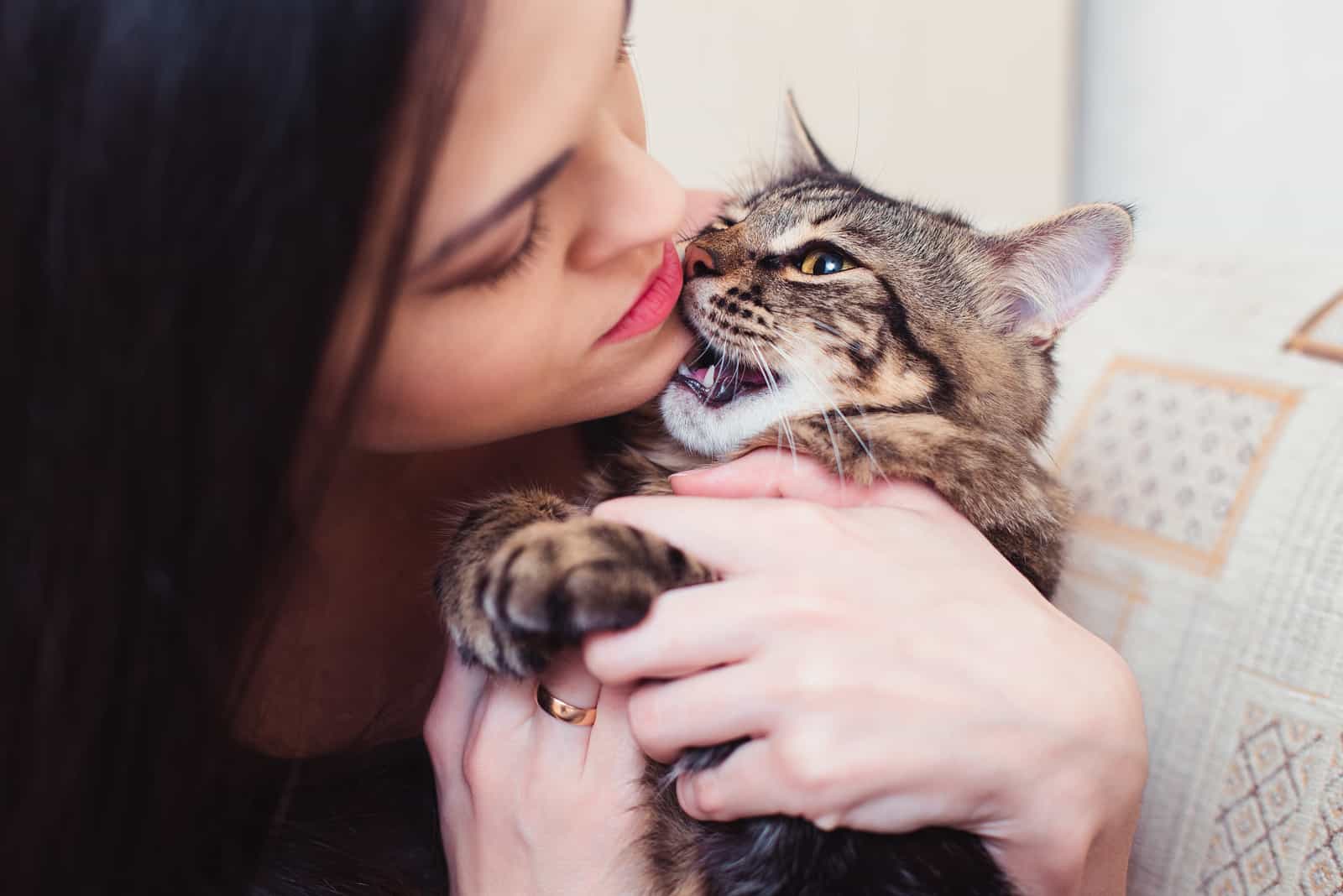
One of the worst things to do when you have a cat is to discipline it in an aggressive manner. Hitting your cat sor screaming at it will only leave your pet confused and traumatized.
Sadly, a lot of people do not understand this until it is too late. When the cat is already traumatized it will respond negatively to any type of training, and the trust may never be restored.
If you have a cat whose former owner was a bully, your cat may just feel stress when around humans. It may be permanently traumatized, and the act of learning to use the litter box may never be learned or relearned.
Building up trust may be a hard task, but rebuilding lost trust is almost impossible.
If you are an abusive cat owner, please give the animal away!
If, however, you have sheltered a cat that has been through trauma, you have to be patient with your new pet. It probably distrusts humans, and trying to forcibly get your way will do no good. If you have already spent a lot of time bonding with your cat, try consulting a cat behaviorist, they may have more insight into why your cat is having problems with urination.
Also, understand that there are many things you can do to distress a cat, even if you don’t intend it. For example, you can be having an argument at home, listening to loud music, etc. and your cat may feel distress over it, which may affect their urination habits.
8. Attention Seeking
Yes, they often seem like they don’t care about you, but that is not the truth. Cats will often build a bond with their owner, and a lack of attention will often distress them.
Cats need daily stimulation and playtime or they might start acting crazy. This is especially true for indoor cats. Their hunting instinct needs to be satisfied and lazing about the house just won’t do it!
Try spending at least 20 minutes a day playing with your cat. Also, make sure your cat has other things to play with, like toys. You will not always be able to play with them and toys will help remedy that.
9. Litter Box Problems
We have already mentioned that the location and type of the litter box may affect your cat’s ability to use it. This object is very important in a household, to both pet and owner.
The owner wants the place to remain clean, and the cat requires the freedom to do their business whenever they want in a secure, clean place where they feel safe and comfortable.
However, when it comes to cat litter, a lot of cats are not okay with doing their business in a soiled litter box. Urine, and especially poop, should be cleaned daily, of course, but there are a lot of cats who won’t even consider littering in a previously used litter box.
This means that “oh no my bed!” could become your catchphrase if your cleaning schedule is not on point.
To avoid this, try installing several more litter boxes around your home, to be certain your cat always has a clean one. The golden rule is to have a litter box for each cat, plus one, which means at least two for one cat.
Final Thoughts
All in all, there can be many reasons for your cat peeing outside the designated place. Some may be your fault, others may be situational, or even medical.
The fact remains, the phrase “my cat peed on my clothes right in front of me” is the one no one wants to type or utter. Cat litter smells so strongly that regular cleaning products won’t remove it entirely.
You will need a special pet odor removal product, which will contain enzymes that deal with the molecules responsible for the stink. Even if you don’t smell the urine, your cat might, which will prompt it to soil your clothes again.
If you need a quick solution, try using baking soda and vinegar to deal with the smell.
Monitor your cat’s behavior, make sure it is healthy and comfortable, and this stinky situation will probably not be repeated.

